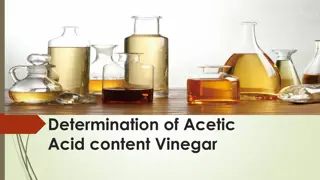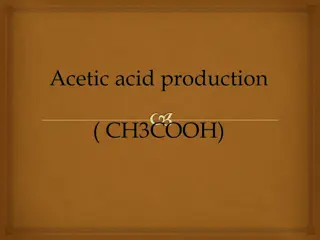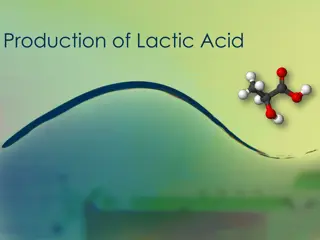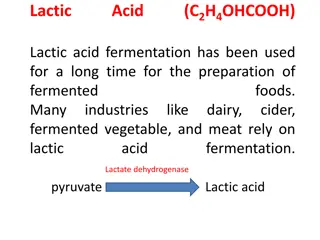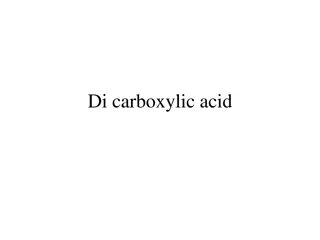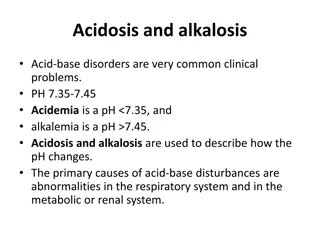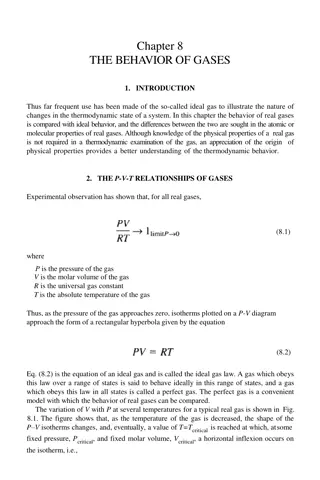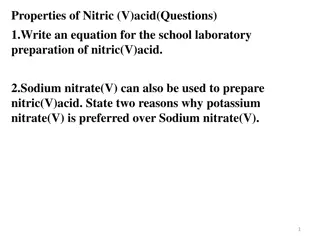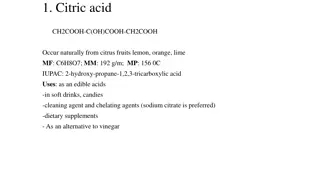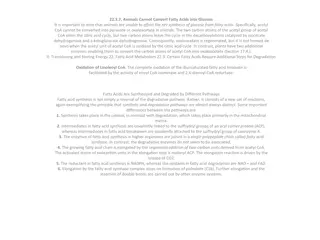Understanding the States of Matter: Solids, Liquids, and Gases
Matter is anything that occupies space and has mass, consisting of tiny particles like atoms and molecules. Solids have closely packed particles, liquids have less densely packed particles that can flow, and gases have spread out particles. Solids retain their shape, liquids take the shape of their
7 views • 11 slides
Understanding Properties of Gases and Gas Laws
Gases exhibit unique properties compared to solids and liquids, including compressibility and variable densities. Pressure is defined as force per unit area, with common pressure units like atm, mmHg, and torr. Gas laws such as Gay-Lussac's Law, Boyle's Law, and Charles's Law describe the relationsh
4 views • 33 slides
Best Acetic Acid Glacial Manufacturer Company - Modi Chemical
Modi Chemical stands out as the premier acetic acid glacial manufacturer, dedicated to delivering top-notch quality and unmatched customer service. With a strong focus on sustainability and innovation, Modi Chemical has become the go-to source for high-purity acetic acid glacial, catering to a wide
2 views • 1 slides
M-TOLUIC ACID Manufacturer in Gujarat - Modi Chemical
Modi Chemical is the top m-toluic acid manufacturer in Gujarat, renowned for delivering high-quality, pure m-toluic acid. Our state-of-the-art facilities and stringent quality control ensure exceptional product consistency and reliability. Committed to sustainability and innovation, we serve a wide
0 views • 1 slides
Industrial Production of Citric Acid and Microbial Fermentation
Industrial production of citric acid has evolved from extraction processes to microbial fermentation, offering various industrial applications. Citric acid is utilized as an acidulant in food and pharmaceutical industries, a chelating agent in tanning, and a flavor enhancer in carbonated beverages.
1 views • 18 slides
Understanding Kinetic Theory of Gases: Key Concepts and Equations
Exploring the kinetic theory of gases, this content covers essential concepts such as ideal gas behavior, molar mass, the equation of state, and isobaric/isothermal processes. Discover the relationship between pressure, volume, and temperature in gases, along with practical examples and calculations
0 views • 49 slides
Types of Gases in Tunnelling & Gas Monitoring Sensors in TBM
Understanding the types of gases encountered in tunnelling is crucial for safety. Gases like carbon monoxide, carbon dioxide, nitrogen oxides, methane, and hydrogen sulfide are common in TBM environments. Proper gas monitoring sensor placement inside the TBM is essential to detect hazardous gas leve
0 views • 11 slides
Gas Laws and Properties: Understanding the Behavior of Gases
Gas laws govern the behavior of gases and their properties in various conditions. From the total pressure of gas mixtures to calculating partial pressures, understanding the relationship between pressure, volume, temperature, and amount of gas is crucial. Effusion and diffusion play key roles in how
0 views • 16 slides
Understanding Acid-Base Balance in Health and Disease
Many critical illnesses can disrupt acid-base balance, indicating underlying diseases or organ damage. Interpretation of disturbances requires analyzing arterial blood gases, plasma electrolytes, and compensatory mechanisms. Acid-base disorders are classified into respiratory acidosis, respiratory a
3 views • 26 slides
Industrial Production of Citric Acid: Fermentation Processes and Applications
Citric acid is industrially produced through microbial fermentation processes. It is widely used in various industries such as food, pharmaceuticals, and beverage production. Different methods like surface culture fermentation are employed for citric acid manufacture, with fungi like Aspergillus nig
4 views • 18 slides
Exploring Properties of Matter: Solids, Liquids, and Gases
Dive into the characteristics of solids, liquids, and gases through engaging visuals and key vocabulary. Understand the behavior of particles in different states of matter and learn about the properties that define each state. Explore examples of solids, liquids, and gases with a focus on their uniq
0 views • 19 slides
Limit Test of Iron Based on Color Reaction with Thioglycollic Acid
The limit test for iron involves the reaction of iron in ammoniacal solution with citric acid and thioglycollic acid to form a reddish-purple color. By comparing the color produced with a standard solution, the presence of iron is determined. Citric acid prevents precipitation of iron, while thiogly
1 views • 5 slides
Understanding the Impact of Acid Rain on Ecosystems
Investigate the effects of acid rain caused by fossil fuel combustion on water acidity, plant life, animals, and structures. Learn how nitrogen oxides and sulfur dioxide create acid solutions in the atmosphere, affecting watersheds and sensitive ecosystems. Explore the devastating consequences of ac
1 views • 20 slides
Determination of Acetic Acid Content in Vinegar Experiment
The experiment aims to measure the total acid concentration in a specific brand of vinegar through a titration process using NaOH solution. The procedure involves titrating the vinegar solution with NaOH until a pink color appears, calculating the concentration of acetic acid, and determining the pe
3 views • 8 slides
The Production and Uses of Acetic Acid: From Ancient Practices to Modern Applications
The production of acetic acid, specifically in the form of vinegar, has a long history dating back to ancient times. Vinegar was utilized for various purposes such as a food condiment, treating wounds, and addressing different illnesses. Today, acetic acid is mainly used in the food industry for con
1 views • 17 slides
Overview of Lactic Acid Production and Applications
Lactic acid occurs in two isomeric forms and has various applications in food, pharmaceuticals, and skincare industries. It is primarily produced through the fermentation of sugars by microorganisms. The production process involves using raw materials like purified sugars and agricultural wastes. Th
4 views • 11 slides
Understanding Enzyme Catalysis and Active Site Role
Enzymes play a crucial role in catalyzing biochemical reactions by stabilizing transition states through their active sites. Different mechanisms like acid-base, covalent, metal, and electrostatic interactions are employed for stabilization. Acid-base catalysis involves acceleration without being co
1 views • 21 slides
Synthesis of Salicylic Acid: Theory, Derivatives, and Applications
Salicylic acid is synthesized from methyl salicylate through ester hydrolysis with aqueous alkali. It is a versatile compound used in organic synthesis, as a plant hormone, and derived from salicin metabolism. The derivatives of salicylic acid can minimize gastric disturbances and enhance therapeuti
4 views • 12 slides
The Noble Gases: Properties, Sources, and Uses
The noble gases, including helium, neon, argon, krypton, xenon, radon, and Oganesson, are characterized by their low reactivity due to a complete electron configuration. They have diverse applications, such as forming inert atmospheres, medical treatments, and lighting technologies. Naturally occurr
0 views • 16 slides
Overview of Salicylic Acid and its Derivatives
Salicylic acid is known for its antiseptic, germicidal, and analgesic properties, used in various applications such as preservatives, wart treatments, and pain relief. Different derivatives of salicylic acid are developed to minimize side effects and enhance efficacy. Acetyl salicylic acid (ASA), co
0 views • 15 slides
Important Bacterial Groups in Food
Bacteria play a crucial role in food, with various groups such as Lactic Acid Bacteria, Acetic Acid Bacteria, Propionic Acid Bacteria, Butyric Acid Bacteria, Proteolytic Bacteria, Lipolytic Bacteria, Saccharolytic Bacteria, and Pectinolytic Bacteria identified for their specific roles in food fermen
0 views • 17 slides
Lactic Acid Fermentation in Food Industry
Lactic acid fermentation is a widely used method for producing fermented foods like dairy, vegetables, and meats. This process involves lactic acid bacteria and filamentous fungi to convert sugars into lactic acid. Various microbial cultures are utilized, and raw materials such as whey, molasses, an
0 views • 23 slides
Understanding Arterial Blood Gases and Oxygen Delivery Devices
Arterial blood gases (ABG) are obtained from arteries to assess acid-base balance and blood oxygen levels. The pH, PaCO2, PaO2, HCO3, and SaO2 are crucial values on an ABG report. These values reflect the blood's acid-base status, carbon dioxide levels, oxygen saturation, and more. The buffer system
0 views • 25 slides
Understanding Purine Degradation and Gout
Purine degradation pathway involves the breakdown of dietary nucleic acids, mainly from meat, into uric acid through specific enzymatic steps. Excessive uric acid production can lead to conditions like gout and hyperuricemia. Humans excrete uric acid in the urine as the final product, while other an
1 views • 12 slides
Understanding Acid-Base Balance and Regulation in the Body
Acid-base balance is crucial for maintaining optimal physiological functions. This content explains the definitions of acids and bases, differentiates between strong and weak varieties, explores the significance of pH control in body fluids, and delves into the roles of buffers, kidneys, and lungs i
0 views • 20 slides
Understanding Matter: Solids, Liquids, Gases, and Fluids
Matter exists in various states - solid, liquid, gas, and fluid. Solids have atoms closely packed, liquids have more freedom but still cohesion, gases have atoms spread out, and fluids flow like liquids or gases. Mass density characterizes matter based on atom proximity. Gas pressure results from mo
0 views • 22 slides
Understanding DiCarboxylic Acid: Properties, Preparation, and Uses
DiCarboxylic acid is an organic compound containing two carboxyl functional groups. Focus on Oxalic acid, its physical and chemical properties, preparation methods, and various applications including as a cleaning agent, in industrial processes, and potential medicinal uses. Learn about the unique c
0 views • 10 slides
Understanding Acidosis and Alkalosis in Acid-Base Disorders
Acid-base disorders, involving acidosis and alkalosis, are common in clinical practice. These conditions are characterized by changes in pH levels, with acidemia (pH < 7.35) and alkalemia (pH > 7.45) representing acidosis and alkalosis, respectively. The primary causes of these imbalances lie within
0 views • 17 slides
Storage and Manipulation of Liquefied Gases with Dewars and Cryostats
Storage and manipulation of liquefied gases involve using specialized equipment like Dewars and Cryostats to minimize heat transfer and maintain low temperatures. Dewars, invented by James Dewar, are double-walled vacuum vessels designed to store liquefied gases with minimal losses. The use of vacuu
0 views • 11 slides
Understanding the Kinetic Theory of Gases and Ideal Gas Model
Explore the Kinetic Theory of Gases, the Molecular Model of Ideal Gases, and concepts like pressure, temperature, and heat capacity. Understand the fundamental properties of gases, including the distribution of molecular speeds and equations that describe gas behavior. Learn about the mole concept,
0 views • 23 slides
Understanding the Behavior of Gases: A Comparison of Real and Ideal Gases
This chapter delves into the behavior of gases, contrasting real gases with the ideal gas model. It explores the P-V-T relationships of gases, highlighting the differences between ideal and real gas behaviors based on molecular properties. The critical point where coexisting gas and liquid phases co
0 views • 40 slides
Laboratory Preparation of Nitric(V) Acid & Chemical Reactions
In this set of questions, we explore the preparation of nitric(V) acid in a school laboratory setting, its properties, and chemical reactions. Topics covered include the use of sodium nitrate(V) and potassium nitrate(V), the use of glass apparatus during the preparation process, color changes in con
0 views • 4 slides
Understanding Acid Rain and Its Environmental Impact
Exploring the phenomenon of acid rain, this activity investigates the effects of fossil fuel emissions on water acidity. By using a pH-meter sensor, participants create hypotheses and conduct experiments to understand what determines the pH of acid rain. Theoretical insights reveal how nitrogen oxid
1 views • 20 slides
Common Organic Acids and Their Uses in Various Industries
Citric acid, lactic acid, salicylic acid, and tartaric acid are natural acids found in various fruits. They have diverse applications in food and beverage, pharmaceutical, and cosmetic industries. These acids are used for flavoring, cleaning, as food additives, and in the preparation of various prod
0 views • 4 slides
Equilibrium and Acid-Base Problems in Chemistry Lecture
In this lecture, topics such as Advanced Equilibrium, Acid/Base Equilibria, Systematic Method for solving chemical problems, Strong Acid/Strong Base scenarios, and General Comments on reactions are discussed. Examples using the systematic method are provided for practical understanding. Key points o
0 views • 13 slides
The Ultimate Guide to Salicylic Acid Cream for Clearer Skin
This article explores the benefits of salicylic acid cream, how it works, and the best options available in Pakistan. We\u2019ll also guide you on where to find the best salicylic acid products and what to consider when buying salicylic acid cream in
0 views • 4 slides
Top 5 Salicylic Acid Body Washes for Clear Skin
Salicylic acid, a powerful beta hydroxy acid (BHA), is known for its remarkable ability to fight acne and improve skin texture. As an ingredient commonly found in skincare products, salicylic acid body washes are particularly effective for treating b
0 views • 4 slides
Understanding Serum Uric Acid Levels and Hyperuricemia
Serum uric acid is a crucial marker of purine metabolism, with elevated levels indicating hyperuricemia which can lead to conditions like Gout. The measurement of serum uric acid helps in diagnosing hyperuricemia, with serum being the preferred specimen for testing. Various factors such as diet, gen
0 views • 12 slides
Understanding Gases in the Environment and Their Impact on Earth
Gases such as CO, CO2, SO2, O2, and O3 play a crucial role in shaping our environment. This chapter delves into the properties of gases, the three states of matter, pressure exerted by gases, atmospheric pressure measurement methods, and units of pressure used in scientific fields.
0 views • 25 slides
Understanding Fatty Acid Metabolism in Animals
Animals cannot convert fatty acids into glucose due to the inability to synthesize glucose from fatty acids. The process involves acetyl-CoA not being converted into pyruvate or oxaloacetate, leading to the citric acid cycle and differences between fatty acid synthesis and degradation pathways. Key
0 views • 8 slides













